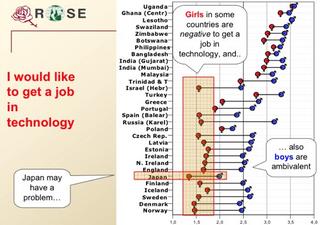
There’s plenty of concern about the lack of interest and knowledge about technology and natural science among children and students. However, it’s a little hard for me to see exactly where the problem lies. For instance, The ROSE study, which has asked a huge number of children all over the world about their interests in science, clearly shows that children in the richest countries have the least interest and respect for science.
A particularly telling statistic is this figure, which I have taken from a presentation by Norwegian professor Svein Sjöberg who leads the Rose study.
Kids were asked if they would like to get a job in technology. This is very appealing to kids in countries like Lesotho, Uganda or Zimbabwe, whereas kids are increasingly negative the richer the country the come from is. The least interested in a technology job are Japanese boys.
Other questions in the study show pretty much the same attitude to science and technology.
Now, does this mean that Japanese boys don’t care about technology? I doubt it. It’s hard to think of anyone who are more inundated by technology than japanese boys. They live in a world that is nothing but technology, and mastering technology determines how well they can participate socially in society.
Technology in Osaka is not the same as in Kampala. The japanese boy may not be interested in basic technology, because it is not relevant and immediately necessary for him to know about it in the same way that it is for someone in Uganda.
You miss something very important if you don’t realize that the japanese boy is very likely to have an expert knowledge in technologies like sharing files, surfing and downloading, choosing the right shoe for athletics or the set of headphones with just the right sound. But it could very well be that this is not ”technology” to him – it’s just the way the world works.
Maybe we need to ask the question in a different way in order to understand what relation students have to science. I bet it would turn out to be a lot more sophisticated than current studies show.
No comments:
Post a Comment